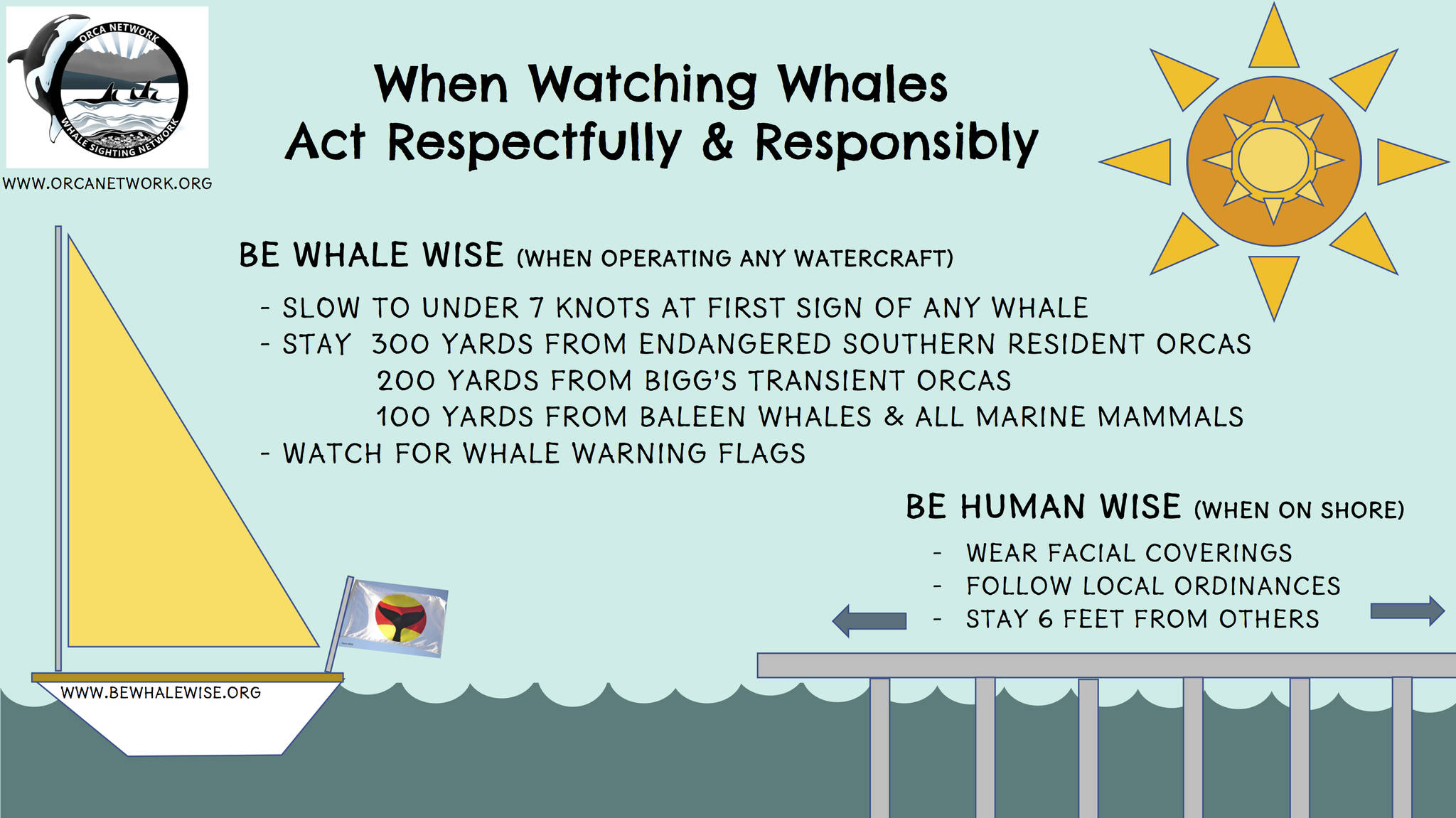Submitted by Orca Network
Orca Network, a Whidbey Island-based nonprofit organization dedicated to raising awareness of the whales of the Pacific Northwest, has just launched their new program “Share the Water” Whale Safe Vessel Program.
For two decades Orca Network has worked with National Oceanic and Atmospheric Administration Fisheries, Washington State Ferries, the Center for Whale Research, Cascadia Research Collective and others to collect and share whale sightings data throughout the Salish Sea and along the Pacific coast. Through the popular Whale Sighting Network, people throughout the region are engaged through this community science effort to observe, collect and share whale sightings. The Sighting Network provides important data on habitat use and changes over time by multiple whale species, helping to inform agency decisions and management plans for endangered Southern Resident orcas and other species. Orca Network reaches over 170,000 people via Facebook pages, and 14,000 receive weekly whale reports with photos, videos, news, research and links to educational events and materials.
Though Orca Network’s Whale Sighting Network has focused on shore-based whale watching and onshore education, outreach to boaters has always been a part of the Sighting Network. For years Orca Network has provided education to watercraft operators through distribution of Be Whale Wise materials, frequent postings of whale safe vessel etiquette on social media, our website, and weekly whale reports, and outreach to tens of thousands through our Langley Whale Center, community events and workshops. Said one member of the Sighting Network, “The sighting reports arriving in my inbox are always interesting and encourage me to be a more careful, sensitive boater.” All of the education, outreach and advocacy done by Orca Network focuses on helping people in the Salish Sea make a real connection with the whales – so they want to learn more about them, which leads people to care and take action to help the whales.
One “side effect” of the Whale Sighting Network has been many eyes on the whales from shore, watching and reporting on not only the whales, but the behavior of vessels/watercraft around them. Orca Network refers all complaints to NOAA enforcement and the Be Whale Wise website, where observed infractions and/or harassment can be reported. The vessel/whale issue has become so polarized in the Salish Sea, the result has been many people becoming angry with all watercraft of every type, regardless of their behavior. Given we and the whales all live in an urban waterway, where there will always be many watercraft or vessels on the water, Orca Network thinks there is a better approach.
Orca Network would love to see increased efforts in education, awareness, and enforcement for recreational watercraft of all types, particularly in the narrower inland waters of Puget Sound. Extended visits by Transient/Bigg’s orcas, humpback and gray whales are increasing, especially during spring and summer boating seasons; and Southern Resident orcas rely on Puget Sound for late fall/early winter foraging. The situations observed in Puget Sound the past few weeks clearly demonstrate more needs to be done to address this issue. “What we are seeing in Puget Sound is the perfect storm of an increasing human population and associated increase in recreational and marine traffic, along with greatly increased use of this same habitat by several species of whales,” said Orca Network’s co-founder Susan Berta.
Orca Network received partial funding from Patagonia’s Seattle Store for our “Share the Water” Whale Safe Vessel Program early this year, and have been in discussions with regional ports and other partners about this program as one of several ways to increase safety for whales and vessel operators in Puget Sound. The COVID19 pandemic has slowed this process and averted some hoped-for funds, but we have decided to move forward with the launch of the program, beginning with the distribution of materials and a series of webinars beginning in August.
Orca Network believes education is key as a proactive approach and often is better than enforcement alone. Through the use of the Share the Water Facebook page and distribution of Whale Safe Vessel information (including Be Whale Wise, Washington State Parks Orca Safe boating stickers, and Share the Water information cards (which will include resources on regulations, where to report whale sightings and harassment, and where to report marine mammal strandings) we can continue to broaden our education and outreach to help others adopt safe etiquette when around whales on the water. By educating and engaging vessel operators about whales and marine mammals in the waters around them, we believe they will be motivated to be more careful boaters, and be inspired to learn more and take action to help the whales of the Salish Sea.
In the coming weeks, Orca Network will begin distributing Share the Water Information and reaching out to ports, marinas and boating and yacht clubs throughout Puget Sound, and will be holding a series of Whale Safe Vessel Webinars. Check out the Orca Network and Share the Water Facebook pages, and our Website Sightings page for more information and to sign up for Orca Network’s Whale reports. Please report whales to the Whale Sighting Network at 1-866-ORCANET, info@orcanetwork.org or on the Orca Network Facebook page.



